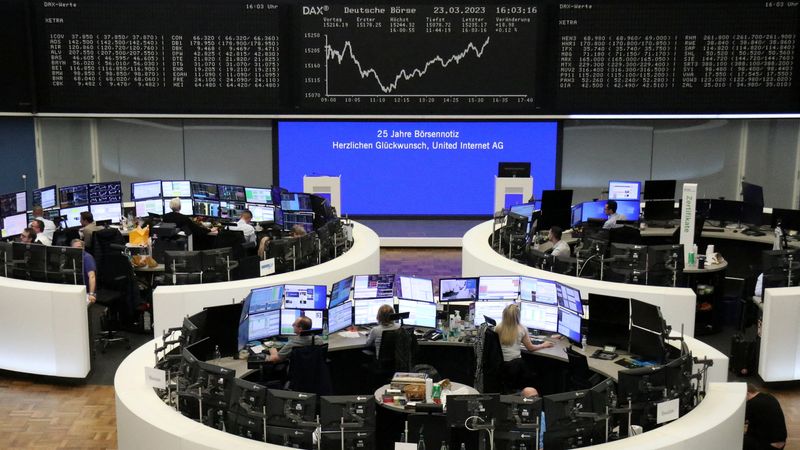By Sruthi Shankar and Bansari Mayur Kamdar
(Reuters) -A steep sell-off in banking stocks hit European indexes on Friday as worries about the stability of the financial sector intensified, with Deutsche Bank (ETR:DBKGn) tumbling as cost of insuring the German bank's debt against the risk of default jumped to a more than four-year high.
The pan-European STOXX 600 index fell 1.4%, but still posted a weekly gain supported by a sharp recovery earlier this week.
"Post what happened to Credit Suisse last weekend, investors don't want to hold on to positions that have any concern around them over the weekend, getting out of such positions is probably what we're seeing with Deutsche Bank," said Paul van der Westhuizen.
"And, of course, there is money to be made if you're on the right side of an over-reaction in the stocks."
Deutsche Bank tumbled 8.5%, after a sharp jump in the cost of insuring against the risk of default. The German heavyweight said that it would redeem $1.5 billion of Tier 2 notes due in 2028.
"Deutsche Bank has taken the place of Credit Suisse really as being the next sort of weakest link in the chain, possibly unjustly," said David Goebel, associate director of investment strategy at Evelyn Partners.
Shares of UBS Group AG (SIX:UBSG) and Credit Suisse AG fell 3.6% and 5.2%, respectively, after Bloomberg News reported they were among the banks under scrutiny in a U.S. Department of Justice (DOJ) probe into whether financial professionals helped Russian oligarchs evade sanctions.
European banks fell 3.8% and were set for their third week of declines, after the failure of U.S. mid-sized lenders and the turmoil at Credit Suisse highlighted growing risks to banks in the wake of tightening financial conditions.
Austria's Raiffeisen Bank International slid 7.9% after Reuters reported the European Central Bank was pressing the bank to unwind its highly profitable business in Russia.
European Union leaders and the ECB sought to calm market jitters by presenting a united front on the banking sector, saying EU lenders were well capitalised and liquid thanks to lessons drawn after the 2008 Lehman Brothers collapse.
A series of interest rate hikes from the Federal Reserve and other central banks in Europe this week also added to fears of tightening financial conditions even as the U.S. central bank signalled a pause in its hiking cycle.

The STOXX 600 is up just 3.5% on a year-to-date basis, having risen as much as 10% at one point. The U.S. benchmark S&P 500, meanwhile, is up 2.9% so far this year.
An S&P Global (NYSE:SPGI) survey showed business activity across the eurozone unexpectedly accelerated this month as consumers splashed out on services, but weakening demand for manufactured goods deepened the downturn in the factory sector.